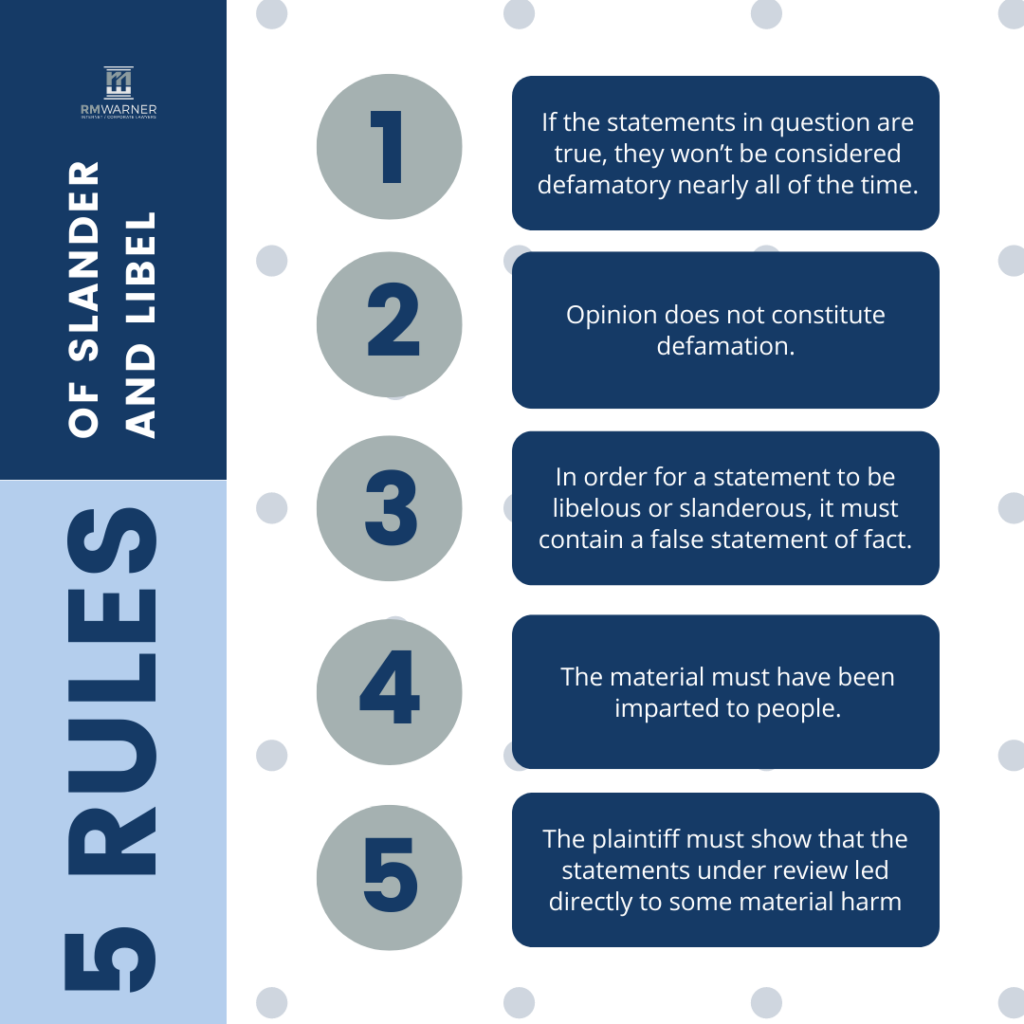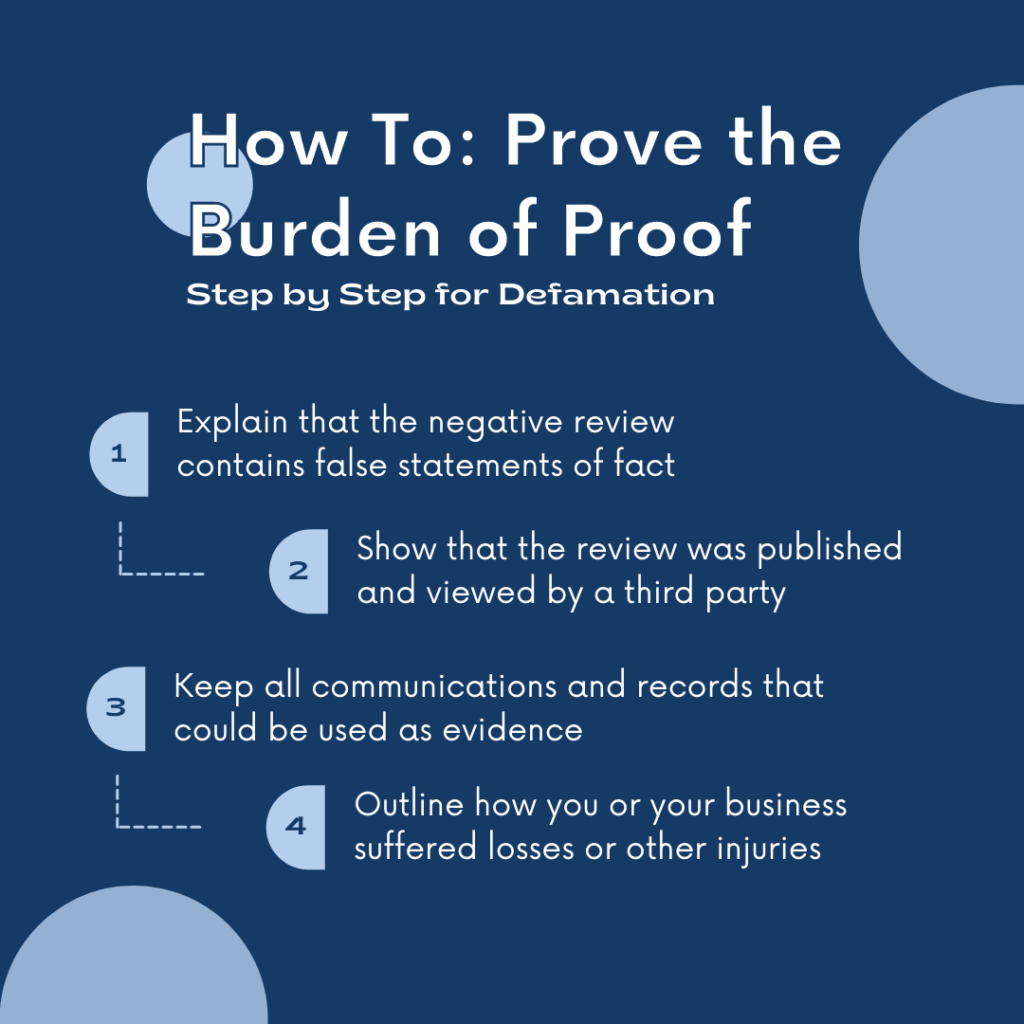Defamation, slander, and libel all refer to when someone communicates false information to a third party that is harmful to another’s reputation. Libel is defamation that is communicated in writing. Slander is defamation that is communicated orally.
Examples of Libel and Slander
Some examples of slander or libel may include:
- Falsely spreading rumours that a person is having an affair, leading to the individual being ostracized, shunned, or excluded by others.
- Falsely accusing someone of theft, leading to the individual’s reputation being smeared.
- Falsely spreading rumours about a restaurant, causing people to turn away from the business, leading to a loss of revenue.
- Falsely accusing someone of sexual assault.
Understanding Defamation
Defamation law varies from state to state, but the basic premise remains the same: defamation law exists to protect a person’s reputation against harm done by people making false statements. Although it may appear that protecting someone’s reputation conflicts with other rights, such as freedom of speech, this is false. In the United States, the First Amendment protects freedom of speech. However, defamation has never been a form of protected speech, and the line between what is defamatory speech and what is protected speech is not always clear. In defamation cases, it’s important to balance these First Amendment protections while also protecting the person whose reputation has been damaged. Disagreement and difference of opinion are essential for any society to function smoothly, so balancing the two can sometimes be a delicate task.
Defamation is not considered a crime in most instances; it is a tort (a civil wrong). Therefore, a person who defames another will rarely face criminal charges but could be subject to a lawsuit for damages. However, there are situations where the defamation can be so severe that it reaches the level of criminal harassment.
How Do You Prove Defamation?
Generally, for a statement to be considered defamatory, the following conditions must be met:
- Published: The statement must be communicated or “published” to a third party.
- False: The statement must be objectively false.
- Harm: The statement must have caused some form of reputational injury.
- Unprivileged: The statement must not be privileged. There are some situations where false statements are covered by privilege and therefore cannot be used as the basis for a defamation claim. One simple example would be when a person testifies in court and makes a statement that is defamatory.
- Intent: The person communicating the defamatory statement must have done so in a negligent, or malicious, manner. Whether malice is required may depend on several factors, including whether the potential plaintiff is a public figure and whether the statement could be privileged.
If one of these conditions is not met, grounds for filing a defamation lawsuit become tenuous at best.
On top of meeting all of the above requirements, public officials and public figures must also prove that the defendant acted with actual malice. This means they must present clear and convincing evidence that the statement was made knowing it was false or with reckless disregard for the truth.
High-profile figures, including celebrities, politicians, and financiers, are often subject to false rumours and misinformation. Due to the public and damaging nature of the accusations, many of these high-profile figures pursue defamation charges. For example, in 2017, former Alaska governor Sarah Palin filed a libel suit against The New York Times for printing a story suggesting that Palin was linked to a 2011 mass shooting in which congresswoman Gabrielle Giffords was severely wounded.
What’s the Difference Between Opinion and Defamation?
As noted earlier, it’s important to protect First Amendment rights. First Amendment protections afford citizens the ability to freely and openly make opinions without fear of legal backlash. Under the law, an opinion is something that can’t objectively be proven to be true or false. However, if someone were to include an accusation in an opinion, for example, “I think they stole money from their boss,” this is potentially defamatory if the accusation is capable of being proven true or false. Prefacing statements with, “in my opinion,” or “I think,” will not magically transform an otherwise defamatory statement into an opinion.
When to Hire a Defamation Lawyer
Today, there is a steady rise in defamation cases, thanks in part to the rise of online digital communications. As a result, there is more demand for defamation lawyers who are experts in media law and online defamation cases.
If you are a victim of defamation, you should consider hiring a defamation lawyer.
At RM Warner Law, our lawyers have successfully represented clients in defamation suits all over the United States. Give us a call today to schedule a consultation to learn how we can help with your case, or fill out our contact form.







Leave a Reply
Your email is safe with us.